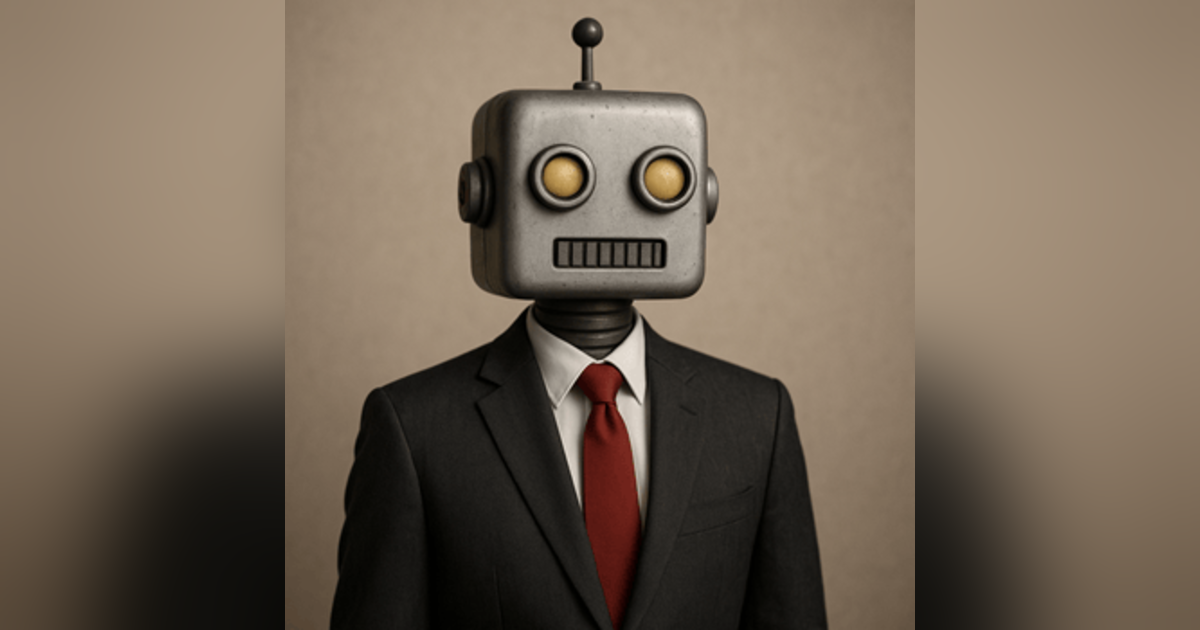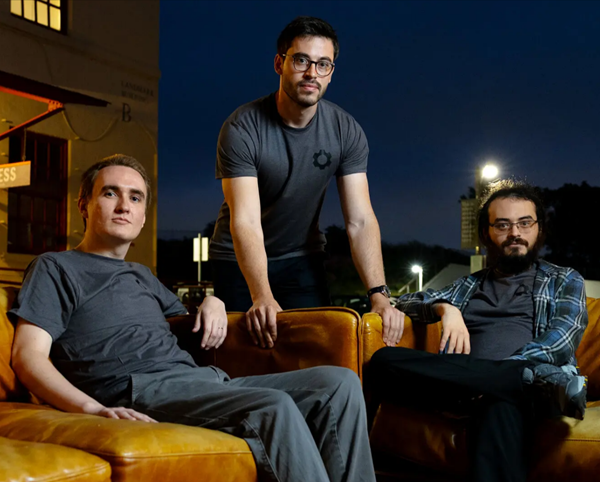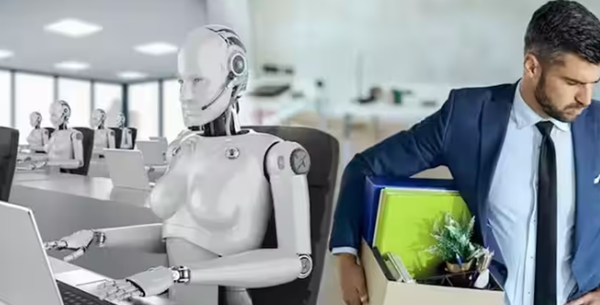A.I. for Suits: The Corporate Disruption Begins

Learn how Mechanizes bold mission to automate office work 'as fast as possible' is not a pipe dream. Their founders claim it's not about job loss—it's about liberation from drudgery. But is that the whole story? Supporting links 1. CEO of Fiverr Says A.I. Is Definitely Taking Your Job [Entrepreneur] 2. Will AI take your job? The answer could hinge on the 4 S's [The Conversation] 3. Bosses want you to know A.I. is coming for your job [MS...
Learn how Mechanizes bold mission to automate office work 'as fast as possible' is not a pipe dream. Their founders claim it's not about job loss—it's about liberation from drudgery. But is that the whole story?
Supporting links
1. CEO of Fiverr Says A.I. Is Definitely Taking Your Job [Entrepreneur]
2. Will AI take your job? The answer could hinge on the 4 S's [The Conversation]
3. Bosses want you to know A.I. is coming for your job [MSN]
4. Epoch AI [website]
5. Mechanize Manifesto [website]
Contact That's Life, I Swear
- Visit my website: https://www.thatslifeiswear.com
- Twitter at @RedPhantom
- Bluesky at @rickbarron.bsky.social
- Email us at https://www.thatslifeiswear.com/contact/
Episode Review
- Submit on Apple Podcast
- Submit on That's Life, I Swear website
Other topics?
- Do you have topics of interest you'd like to hear for future podcasts? Please email us
Interviews
- Contact me here https://www.thatslifeiswear.com/contact/, if you wish to be a guest for a interview on a topic of interest
Listen to podcast audios
- Apple https://apple.co/3MAFxhb
- Spotify https://spoti.fi/3xCzww4
- My Website: https://bit.ly/39CE9MB
Other
- Music ...
⏱️ 21 min read
Would you believe there’s an A.I. startup that has the audacity to say it wants to take your job!
Mechanize, a San Francisco startup, is building artificial intelligence tools to automate white-collar jobs "as fast as possible."
What if your next coworker wasn't human? Mechanize doesn't seem to care as it's racing to build A.I. that could transform—and possibly replace—white-collar jobs. Is this the dawn of digital assistants or the death of the desk job?"
We'll learn how Mechanizes bold mission to automate office work 'as fast as possible' is not a pipe dream. Their founders claim it's not about job loss—it's about liberation from drudgery. But is that the whole story?
Welcome to That's Life, I Swear. This podcast is about life's happenings in this world that conjure up such words as intriguing, frightening, life-changing, inspiring, and more. I'm Rick Barron your host.
That said, here's the rest of this story
The Great Displacement: How Silicon Valley's A.I. Revolution Threatens to Hollow Out Human Society
The Death of Deception
There was a time, not so long ago, when Silicon Valley's tech moguls possessed enough shame to cloak their intentions in comforting lies. They spoke of "augmentation" rather than replacement, of "liberation" from tedious tasks rather than wholesale elimination of human purpose. These weren't just marketing ploys—they were the last gasps of a dying corporate conscience, the final acknowledgment that destroying millions of livelihoods might require some justification.
"We're not automating workers, we're augmenting them," the executives would recite with practiced sincerity. "Our A.I. tools won't destroy jobs. They'll be helpful assistants that will free workers from mundane drudgery."
Aaah, there it is, the magical words we've been waiting for…' free workers from mundane drudgery'.
These declarations, repeated in boardrooms and conference halls across the Valley, served a dual purpose: they pacified nervous employees while providing cover for the systematic dismantling of human economic relevance.
But those days of diplomatic doublespeak are over. The mask has not merely slipped—it has been violently torn away, revealing the cold, calculating machinery beneath. Today's tech leaders speak with the brazen honesty of executioners, openly discussing their plans to render human labor obsolete with the casual detachment of discussing quarterly earnings.
The transformation didn't happen overnight. Years ago, artificial intelligence was little more than a sophisticated parlor trick, capable of winning at chess but incapable of threatening a college graduate's career prospects. The technology wasn't refined enough to penetrate the complex domains of white-collar work, such as consulting, finance, software development, and legal services. These industries represented fortresses of human expertise, seemingly impregnable to algorithmic assault.
But guess what, fortresses fall, and the walls are crumbling faster than anyone anticipated.
The Algorithmic Invasion
Today's A.I. systems represent a quantum leap beyond their primitive predecessors. They craft elegant code, produce comprehensive research reports that rival human analysts, and solve complex mathematical theorems that would challenge PhD candidates. The emergence of A.I. "agents"—autonomous digital entities capable of executing multi-step tasks, self-correction, and adaptive learning—marks the beginning of humanity's economic obsolescence.
These aren't just tools anymore. They're digital employees, tireless and uncomplaining, working around the clock without benefits, no sick days, or the inconvenient tendency to demand fair wages. They represent the ultimate workforce: perfectly obedient, infinitely scalable, and utterly replaceable. Yes, let the corporate profits inflate!
The early victims are already appearing. College graduates, once insulated from automation's reach by their education and specialized skills, now face unemployment rates that would have seemed impossible just a few years ago. Companies across industries are quietly replacing entry-level human workers with A.I. alternatives, conducting a stealth campaign of economic ethnic cleansing that targets the very people who followed society's prescribed path to success.
The implications extend far beyond individual career disruption. We're witnessing the systematic dismantling of the social contract that has governed human civilization for centuries: the understanding that education, effort, and competence would be rewarded with economic opportunity. That contract is being shredded, one algorithm at a time.
The Mechanized Future
Mechanize, a startup founded by three former A.I. researchers, shared their vision for humanity's future with the enthusiasm typically reserved for announcing a new smartphone.
From left, the founders of the A.I. start-up Mechanize: Matthew Barnett, Tamay Besiroglu and Ege Erdil. Courtesy of New York Times
The company was founded in 2025 by Matthew Barnett, Tamay Besiroglu, and Ege Erdil, who worked together at Epoch AI, a research firm that studies the capabilities of A.I. systems.
Their mission statement reads like a dystopian manifesto: complete automation of all human labor, pursued with the relentless efficiency of a military campaign.
"Our goal is to automate work fully," declared Tamay, the company's 29-year-old
co-founder, his words hanging in the air like a death sentence. "We want to get to a fully automated economy, and make that happen as fast as possible."
The casual brutality of this statement is breathtaking. Here is a man, barely out of his twenties, discussing the elimination of human economic participation with the same tone one might use to describe plans for lunch. The absence of empathy, the complete disconnection from the human cost of such ambitions, represents something fundamentally broken in our technological elite.
Mechanize isn't operating in isolation. They're part of a growing ecosystem of companies, investors, and technologists who view human labor as an inefficiency to be eliminated rather than a source of dignity and purpose to be preserved. The corporate chorus grows louder each day:
1. Amazon's Andy Jassy speaks openly of A.I. agents reducing his workforce
2. IBM has already begun replacing human resources personnel with algorithmic counterparts
3. Meta's Mark Zuckerberg hints at A.I. handling human tasks before year's end.
Most chilling of all is the warning from Dario Amodei, CEO of Anthropic, who predicts that AI could displace up to half of all entry-level white-collar jobs by 2030. This isn't speculation—it's a roadmap, delivered by someone with intimate knowledge of A.I.'s capabilities and development path.
The Game of Human Obsolescence
Mechanize's methodology for achieving mass automation is as brilliant as it is terrifying. Using what is termed as reinforcement learning—the same technique that created superhuman game-playing machines—they're constructing elaborate virtual environments that mirror real workplaces. These digital training grounds enable A.I. systems to practice human jobs through countless iterations, rewarded for success and penalized for failure, until they achieve performance levels that render human employees redundant.
It's coming. Are you prepared? Courtesy of NewsBytes
Imagine A.I. entities trained in perfect replicas of offices, complete with email systems, communication platforms, and professional software. These artificial workers practice their craft in simulated environments, learning to navigate corporate hierarchies, manage projects, and produce deliverables with increasing sophistication. With each iteration, they become more competent, more reliable, and more threatening to human employment.
The company's blog post reveals their ultimate ambition with chilling clarity: "We'll only truly know we've succeeded once we've created AI systems capable of taking on nearly every responsibility a human could carry out at a computer." Every responsibility. Every task. Every source of human economic value is reduced to algorithmic efficiency.
The Social Catastrophe
The true horror of mass automation isn't merely economic—it's existential. Work provides more than income; it offers purpose, identity, and social connection. For most people, their profession isn't just what they do—it's who they are. Strip away that identity, and you're left with something far more devastating than unemployment: you're left with a crisis of human meaning.
Envision a world where the vast majority of human skills have been rendered obsolete. Where decades of education, training, and experience count for nothing against the relentless efficiency of artificial intelligence. Where entire industries—law, medicine, engineering, education—have been hollowed out by algorithmic alternatives that never tire, never complain, and never demand recognition for their contributions.
This isn't creative destruction—it's creative annihilation. Previous technological revolutions displaced workers from specific industries while creating new opportunities elsewhere. However, this wave of automation threatens to render human economic utility obsolete entirely, leaving behind a permanent class of the economically irrelevant.
The psychological impact will be staggering. Imagine the despair of a generation that played by society's rules—studying hard, accumulating debt for education, developing expertise—only to discover that their skills have been rendered worthless by silicon and code. The suicide rates, the depression, and the social unrest that will inevitably follow such widespread economic displacement represent a humanitarian crisis of unprecedented scale.
Communities will hollow out as economic opportunity concentrates in the hands of those who own the machines. Small towns and cities built around human labor will become ghost towns, their populations scattered like refugees from a technological war they never saw coming. The social fabric that binds communities together—shared work, everyday struggles, mutual dependence—will unravel as human economic participation becomes optional.
The Oligarchy of Algorithms
What makes this scenario particularly dystopian is the concentration of power it represents in a fully automated economy, wealth, and control flow exclusively to those who own the A.I. systems. The rest of humanity becomes economically irrelevant, dependent on the generosity of their algorithmic overlords for survival.
But wait. According to Mechanize, there's a solution!
The proposed solution—universal basic income funded by AI-generated wealth—reads like a chapter from a dystopian novel. Picture a world where the vast majority of humanity exists on algorithmic charity, their skills obsolete, their contributions unwanted, their purpose undefined. This isn't liberation from drudgery; it's the creation of a permanent dependent class, sustained by the charity of those who control the machines.
The power dynamics are terrifying. When human labor becomes unnecessary, human leverage disappears. Workers can't strike against algorithms. They can't negotiate with code. They can't demand better conditions from systems that don't require conditions at all. The balance of power shifts without question toward capital, creating an oligarchy of unprecedented scope and permanence.
The Ethics of Extinction
During a Q&A session with the three Mechanize co-founders, a question was asked if it’s ethical to automate all labor? The response revealed the moral bankruptcy at the heart of this technological revolution.
Matthew Barnett, one of Mechanize's co-founders who described himself as a libertarian, responded with the cold calculation of an accountant discussing overhead costs. He believes that A.I. will accelerate economic growth and spur breakthroughs in medicine and science, arguing that a prosperous society with full automation would be preferable to a low-growth economy where humans still had jobs.
"If society as a whole becomes much wealthier, then I think that just outweighs the downsides of people losing their jobs," Barnett stated, treating human livelihood as a statistical externality to be optimized away.
This calculus is breathtaking in its cruelty. It reduces human beings to variables in an equation; their dignity and purpose sacrificed on the altar of aggregate wealth. The fact that such views are expressed without shame or hesitation reveals the depth of moral corruption that has infected our technological elite.
The Timelines of Doom
The most chilling aspect of this conversation wasn't the audacity of the goals—it was the matter-of-fact discussion of timelines. Barnett estimates that full automation will take 10 to 20 years, while his co-founders predict 20 to 30 years. These aren't wild fantasies or distant possibilities—they're business projections, backed by venture capital and technological expertise.
Unlike typical Silicon Valley hyperbole, these estimates carry weight. They come from people who understand A.I.'s current capabilities and development path, who have access to the latest research and computational resources, who are actively working to make their predictions reality.
The founders' conservative timelines make their predictions more credible, not less. They're not promising miracles—they're describing the methodical, systematic elimination of human economic relevance, pursued with the same disciplined approach that created the internet, the smartphone, and every other technological revolution that has reshaped human society.
The Absence of Compassion
What straights me most deeply about this attitude with Mechanize isn't their technological ambition—it’s their complete absence of empathy for the people whose lives they plan to disrupt. There’s no recognition of the human cost, no acknowledgment of the suffering their success would cause, no concern for whether society is prepared for such profound change.
When pressed about the transition to an AI-driven economy, Mechanize offers only vague platitudes about "radical abundance" and wealth redistribution. They have no novel policy proposals, no brilliant ideas about expanding social safety nets or retraining workers for new roles. Their only concrete plan is to eliminate jobs as quickly as possible and trust that society will somehow adapt to the wreckage.
In short, people will just get over it. Whew! dodged that bullet.
This isn't just callousness—it's a fundamental failure of moral imagination. Mechanize cannot, or will not, envision the human consequences of their actions. They see only the elegant efficiency of their algorithms, blind to the devastation those algorithms will cause in the lives of real people.
The Honesty of Monsters
Perversely, there's something almost refreshing about this new honesty. At least now we know what we're facing. The pretense is gone, the masks have fallen away, and we can see our technological overlords for what they truly are: brilliant, ruthless, and fundamentally disconnected from human suffering.
But honesty without compassion is just cruelty with better public relations. The fact that they're willing to discuss their plans openly doesn't make those plans any less monstrous. If anything, it makes them more terrifying because it reveals the complete absence of shame or doubt that might otherwise constrain their actions.
We stand at the precipice of a transformation that will make the Industrial Revolution seem like a gentle transition. The question isn't whether this future will arrive—it's whether we'll retain any agency in shaping what comes after. The battle for human economic relevance has begun, and so far, the machines are winning.
The silence from our political leaders, the absence of public debate about these developments, the complete failure to prepare for the social consequences of mass automation—all of this suggests that we're sleepwalking into a dystopian future, guided by the unfeeling logic of algorithms and the profit motives of those who control them.
Time is running out. The machines are coming for our jobs, our purpose, and our dignity. And they're being programmed by people who see that destruction not as a tragedy to be prevented, but as a problem to be solved. [2184 words]
What can we learn from this story? What's the takeaway?
The mask has finally slipped. Where once Silicon Valley's tech titans spoke in euphemisms about "augmenting" human workers, a new breed of entrepreneurs now speaks with bone-chilling clarity about their true intentions: the systematic elimination of human labor.
Gone are the days when artificial intelligence was merely a tool too primitive to threaten white-collar professions. Today's A.I. systems craft code, generate comprehensive analytical reports, and unravel complex scientific puzzles with an efficiency that makes human expertise seem quaint. The emergence of A.I. "agents" — digital entities capable of executing extended task sequences and self-correction — marks a turning point that should send shivers down the spines of every worker.
The warning signs are already materializing. College graduates, once insulated from automation's reach, now face rising unemployment rates that suggest companies have begun quietly replacing entry-level human talent with silicon-based alternatives. What was once science fiction is becoming stark reality.
Well, there you go, my friends; that's life, I swear
For further information regarding the material covered in this episode, I invite you to visit my website, which can be found on Apple Podcasts, for show notes and the episode transcript.
As always, I thank you for the privilege of you listening and your interest.
Be sure to subscribe here or wherever you listen to podcasts so you don't miss an episode.
See you soon.












